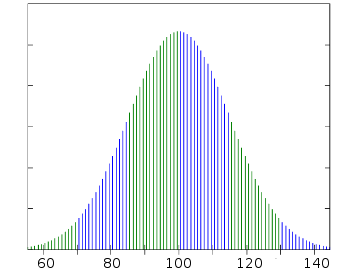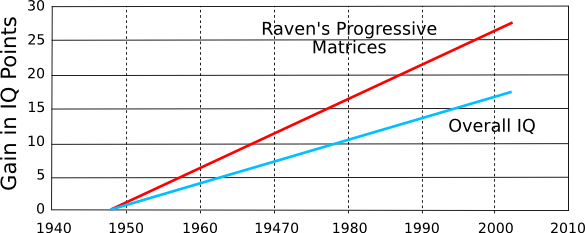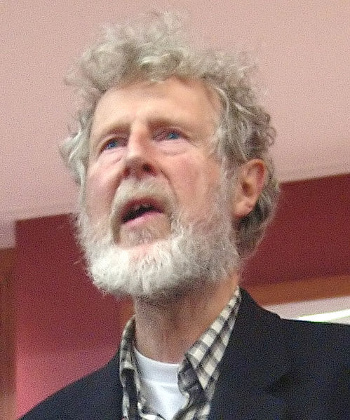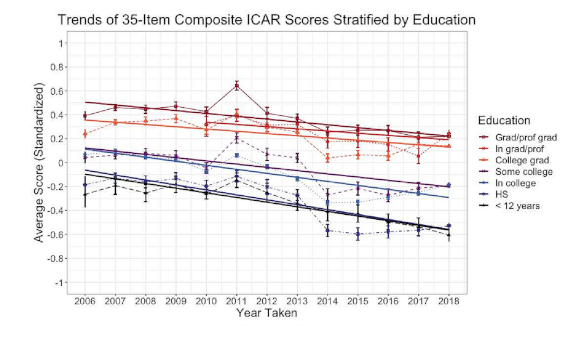The IQ Flynn Effect
May 8, 2023
I recently watched the 2006
movie,
Idiocracy (
Mike Judge,
Director),[1] on one of the many
streaming services. The
plot of the movie involves an
experiment in which a
man and a
woman are placed into a
suspended animation state and forgotten for 500 years. After reanimation, they find themselves in a world in which overall
human intelligence has significantly declined and they are the smartest people in the world. There's an
entertaining clip of this
evolutionary dumbing-down process on
YouTube.[2]
Greater intelligence appears to have had an
evolutionary advantage for
humans, since we have achieved mastery of
our planet, for
better, or for
worse.
Scientists and
mathematicians of high intelligence have been
esteemed by their lesser human
peers. More than a
decade ago, I
compiled a list of the
estimated Intelligence Quotients (IQs) of some famous scientists. Alas, my
references to these estimates have been lost as a consequence of
link rot, but most of these derive from an
historiometric study by
American psychologist,
Catharine Morris Cox (1890-1984).[3] The list appears below.
It's apparent to all that the degree of intelligence among people is not
uniform; and, when something is
variable, scientists want to affix a
number to it, and that's how the idea of an
IQ score arose. The
psychologist,
Lewis Terman,
invented the
Stanford-Binet IQ test to assign a number to intelligence, the Intelligence Quotient. The
quotient label comes from the original definition of intelligence as the
ratio of "
mental age" to "
physical age," the idea being that people
learn throughout their lives, and a ten year old who knows as much as a twelve year old is obviously intelligent. The IQ number is now used
statistically, and it no longer follows the quotient rule (see figure).[3]

Idealized distribution of IQ scores.
The mean is 100, and the standard deviation is 15.
It can be seen from the curve that IQ scores above 140 and below 60 are very rare.
(Graph by Alessio Damato, via Wikimedia Commons))
The foremost
question about intelligence is whether it's primarily determined by
nature or nurture; that is, are
genetics more important than
childhood development. It's estimated that the
heritability of IQ is about 0.75, which is quite significant. As my
wife often states, it's important for
children to choose their
parents wisely. As for nurture,
Richard Feynman had the modestly high IQ of 126, but he was a
notable child prodigy, and his
scientific achievements were in the same class as
Albert Einstein (estimated IQ of 160).
Does IQ above a certain point really matter? One idea is that middling high IQ, such as Feynman's, is good, but extreme IQ comes with some
emotional baggage that counteracts its beneficial affects. As
David Brooks wrote in his book, "
The Social Animal,"[4]
"A person with a 150 IQ is in theory much smarter than a person with a 120 IQ, but those additional 30 points produce little measurable benefit when it comes to lifetime success."
There are many
anecdotal examples of
emotionally disturbed people with high IQ,
Nobel Physics Laureate,
William Shockley (IQ = 129), being one example.[5] However, a 2011 study by
psychologists at
Southern Illinois University,
published in the
journal,
Current Directions in Psychological Science, concludes that "A high level of intellectual ability puts a person at a measurable advantage – and the higher the better."[6] They present evidence that
working memory, which is closely related to general intelligence of the type measured by IQ tests, may distinguish between the "good," and the "great." A series of studies by the authors showed that people who were tested to have greater working memory outperformed others at tasks such as
piano sight reading, outperforming even people with extensive experience and knowledge of the task.
One
criticism of IQ tests is that they are
culturally biased and that they assess not intelligence, but a preconceived
perception of what's intelligent. One non-
verbal intelligence test that's supposedly free of cultural bias was devised by
John C. Raven as his
Master's thesis project in 1936. The
graphical multiple choice questions of this test are now known as
Raven's Progressive Matrices, and an example of one such question appears below. One interesting fact is that
Asperger and
autistic individuals achieve high scores on the Raven test.[7]

An example question from an intelligence test known as Raven's Progressive Matrices.
The images show a clockwise migration of the shaded area, and the blank box is where the next identified image is sketched.
(Colorized version of a Wikimedia Commons image.)
As I wrote in an
earlier article (Rising IQ, April 6, 2015), the scores on IQ tests have been increasing over the years. The non-culturally biased Raven scores have been rising most rapidly. This effect of increasing IQ from
generation to generation is named the
Flynn effect after its discoverer,
James Flynn (1934-2020). The effect is quite pronounced, as the
graph shows. When today's test subjects take the intelligence tests of
yesteryear, they score higher than the original test takers.[8]

Increase in intelligence test scores over the years. The non-verbal Raven's Progressive Matrices test, presumed to be non-culturally biased, shows higher scores. (Graph rendered using Inkscape from data in James R. Flynn, "What Is Intelligence: Beyond the Flynn Effect")
Whenever intelligence tests were revised, the test developers would administer both the older and revised tests to a
panel of subjects as a
calibration. As Flynn discovered in 1982, the test subjects always achieved a strikingly higher IQ score on the older test than the newer one, about three
percentage points per
decade. The
average person today has an IQ of 130 when scored by a hundred year old intelligence test; and, conversely, an average person of yesteryear would appear to have an IQ of just 70 if scored by today's tests, thereby ranking him as
mentally deficient.[2]
There are several
hypotheses to explain the Flynn effect.[8-9]
• Modern people are just better test takers.
• People now think more logically and hypothetically. In the past, education emphasized amassing facts; thus, the idea that memorizing the capitals of the US states was an important task. Today, people who can function abstractly do better in life than those who can recite a poem by memory.
• Parents are pushing their children to excel at an early age.
• The elderly are less burdened by disease.
• Our lives are enhanced by artificial lighting and better nutrition.
• We live in a more visual world, and television, the Internet, and video games prepare us to excel on visual tests such as Raven's Progressive Matrices.

James R. (Jim) Flynn (1934-2020).
Flynn was an emeritus professor of political studies at the University of Otago, Dunedin, New Zealand.
He was born American, and he was an ardent socialist.
Humans strive to adapt to their environment; and, as Flynn remarked in a 2013 TED talk, just 3% of Americans held "cognitively demanding" jobs in 1900, while the percentage is now 35%.[9]
(Wikimedia Commons image by Bryce Edwards.)
A
research team of psychologists from the
Northwestern University Feinberg School of Medicine (Chicago, Illinois),
Northwestern University (Evanston, Illinois) and the
University of Oregon (Eugene, Oregon) have recently published a study in the journal,
Intelligence, of American IQ scores from 2011 to 2018.[10-11] They found a reverse Flynn effect for a large sample of American adults regardless of
age,
education, or
gender.[10] The steepest declines occurred for ages 18–22 and lower levels of education in the
intelligence domains of
matrix reasoning,
letter and
number series, and
verbal reasoning.[10] However, the scores for tasks involving
three-dimensional rotation generally increased.[10]
Psychologists differentiate two types of intelligence; namely,
fluid intelligence and
crystallized intelligence.[10] Fluid intelligence is an individual's ability to reason abstractly and solve problems, and it peaks at age 25 and then steadily declines.[10] Crystallized intelligence is knowledge that's accumulated and learned over the course of time. Crystallized intelligence seems to increase until age 60 and then it declines.[10] Fluid intelligence is often categorized as having three components,
verbal,
perceptual, and image rotation.[10] Image rotation intelligence is the ability to mentally rotate an object in order to solve a
puzzle.[10]
In this study showing the reverse Flynn effect, the researchers used data from a subset of 394,378 adult Americans between 2006 to 2018 from the
Synthetic Aperture Personality Assessment Project (SAPA).[10-11] The SAPA is a free,
survey-based,
online personality test that provides data on 27
temperament traits, such as
adaptability,
impulsivity,
anxiety, and
humor, and their
cognitive ability scores.[11]
It's encouraging to think that your
children and
grandchildren will always be smarter that you, but Flynn supposed that this trend would not go on forever. The Flynn effect of IQ scores was expected to
plateau as early as 2004.[10] This is what the present research seems to indicate. Recent evidence also suggests that visual-spatial intelligence could be declining across certain regions of
Europe.[10]

Trends of 35-item composite International Cognitive Ability Resource (ICAR) scores from 2006-2018, stratified by education, showing the reverse Flynn effect. (A portion of Fig. 1 of Ref. 10.[10] Released under a Creative Commons license. Click for larger image.)
Despite the evidence for declining intelligence, study author
Elizabeth Dworak of the Northwestern University Feinberg School of Medicine says that she doesn't want people to think that Americans are getting less intelligent.[11]
"It doesn't mean their mental ability is lower or higher; it's just a difference in scores that are favoring older or newer samples... It could just be that they're getting worse at taking tests or specifically worse at taking these kinds of tests."[11]
The study didn't examine the reason for this decline in IQ scores, but some potential reasons might be poor nutrition, worsening
health,
media exposures and changes to
education.[11] A shift in
societal values might have affected scores; that is, if society is emphasizing and reinforcing certain behaviors, this would affect performance on an IQ test.[11] As an example, the present emphasis on
STEM education might mean that
abstract reasoning skills are receiving less attention in schools.[11] This study was partially supported by the
National Science Foundation.[11]
References:
- Idiocracy, 2006, Mike Judge, Director, from the Internet Movie Database.
- Idiocracy (2006), Opening Scene, Mike Judge, Director, YouTube video.
- Catherine Morris Cox, "The Early Mental Traits Of Three Hundred Geniuses," Stanford University Press, 1926, 842 pages, ISBN: 9780804700108 (via Google Books).
- David Brooks, "The Social Animal: The Hidden Sources of Love, Character, and Achievement," Random House, March 8, 2011, 448 pp, ISBN: 978-1400067602 (via Amazon).
- As I've written in an earlier article (The Multifaceted William Shockley, July 20, 2020), Shockley's personality may have been affected by an automobile accident in July, 1961, in which he was seriously injured.
- David Z. Hambrick and Elizabeth J. Meinz, "Limits on the Predictive Power of Domain-Specific Experience and Knowledge in Skilled Performance," Current Directions in Psychological Science, vol. 20, no. 5 (October 2011), pp. 275-279. PDF file is available, here.
- Michelle Dawson, Isabelle Soulières, Morton Ann Gernsbacher, and Laurent Mottron, , "The Level and Nature of Autistic Intelligence," Psychological Science August, vol. 18 no. 8 (August, 2007), doi:10.1111/j.1467-9280.2007.01954.x, pp.657-662.
- William Kremer, "Are humans getting cleverer?" BBC World Service, March 1, 2015.
- James Flynn: Why our IQ levels are higher than our grandparents, TED talk, March, 2013.
- Elizabeth M. Dworak, William Revelle, and David M. Condon, "Looking for Flynn effects in a recent online U.S. adult sample: Examining shifts within the SAPA Project," Intelligence, vol. 98, (May-June, 2023), Article no. 101734, https://doi.org/10.1016/j.intell.2023.101734. This is an open access paper with a PDF file available at the same URL.
- Kristin Samuelson, "Americans' IQ scores are lower in some areas, higher in one," Northwestern University News, March 20, 2023.
Linked Keywords: Film; movie; Idiocracy; Mike Judge; film director; streaming media; streaming service; plot (narrative); experiment; man; woman; suspended animation; human intelligence; entertainment; entertaining; video clip; evolution; evolutionary; dumbing-down; YouTube; fitness (biology); evolutionary advantage; human; Earth; our planet; western canon; climate change; scientist; mathematician; respect; esteemed; social group; peer; decade; compilation; list; approximation; estimate; Intelligence Quotient (IQs); citation; reference; link rot; historiometry; historiometric; United States; American; psychologist; Catharine Morris Cox (1890-1984); Leonardo da Vinci; Gottfried Wilhelm von Leibniz; Francis Galton; Blaise Pascal; Isaac Newton; Pierre Simon de Laplace; Galileo Galilei; Joseph Louis Lagrange; René Descartes; Johannes Kepler; Sofia Kovalevskaya; Linus Pauling; Charles Darwin; Nicolaus Copernicus; Albert Einstein; Stephen Hawking; William Shockley; Richard Feynman; James D. Watson; uniform distribution (continuous); dependent and independent variables; number; IQ score; Lewis Terman; invention; invented; Stanford-Binet IQ test; quotient; ratio; mind; mental age; physical age; learning; learn; statistics; statistically; scientific modelling; idealized; probability distribution; expected value; mean; standard deviation; curve; Alessio Damato; Wikimedia Commons; question; nature versus nurture; heritability of IQ; genetics; childhood development; wife; child; children; parent; Richard Feynman; notability; notable; child prodigy; science; scientific; success; achievement; intellectual giftedness; emotional baggage; David Brooks (commentator); The Social Animal; theory; anecdotal evidence; anecdotal example; mental disorder; emotionally disturbed; Nobel Physics Laureate; William Shockley; Southern Illinois University; scientific literature; published; scientific journal; Current Directions in Psychological Science; working memory; piano sight reading; criticism; culture; culturally; bias; biased; perception; word; verbal; John C. Raven; Master's thesis; graphic; graphical; multiple choice; Raven's Progressive Matrices; Asperger syndrome; autism; autistic; clockwise; sketch (drawing); generation; Flynn effect; James Flynn (1934-2020); Cartesian coordinate system; graph; yesteryear; intelligence test scores; Inkscape; human subject research; panel of subjects; calibration; percentage point; decade; average; intellectual disability; mentally deficient; hypotheses; modern history; logic; logically; hypothetically; education; memorization; memorize; capital city; US states; abstraction; abstractly; recitation; recite; poetry; poem; memory; old age; elderly; disease; artificial lighting; nutrition; visual perception; television; Internet; video game; emeritus professor; political science; political studies; University of Otago; Dunedin, New Zealand; democratic socialism; socialist; adaptation; adapt; environment (biophysical); TED (conference); TED talk; cognition; cognitively demanding; 1900; Bryce Edwards; research; Northwestern University Feinberg School of Medicine (Chicago, Illinois); Northwestern University (Evanston, Illinois); University of Oregon (Eugene, Oregon); Intelligence (journal); gender; intelligence domains; matrix reasoning; letter (alphabet); number; series (mathematics); verbal reasoning; three-dimensional space; rotation; fluid intelligence; crystallized intelligence; puzzle; Synthetic Aperture Personality Assessment Project (SAPA); survey (human research); Internet; online; personality test; temperament trait; impulsivity; anxiety; humor; cognitive skill; cognitive ability; grandchild; steady state; plateau; Europe; International Cognitive Ability Resource (ICAR); Creative Commons license; Elizabeth Dworak; health; mass media; society; societal; value (ethics); STEM field; abstract reasoning skill; National Science Foundation.